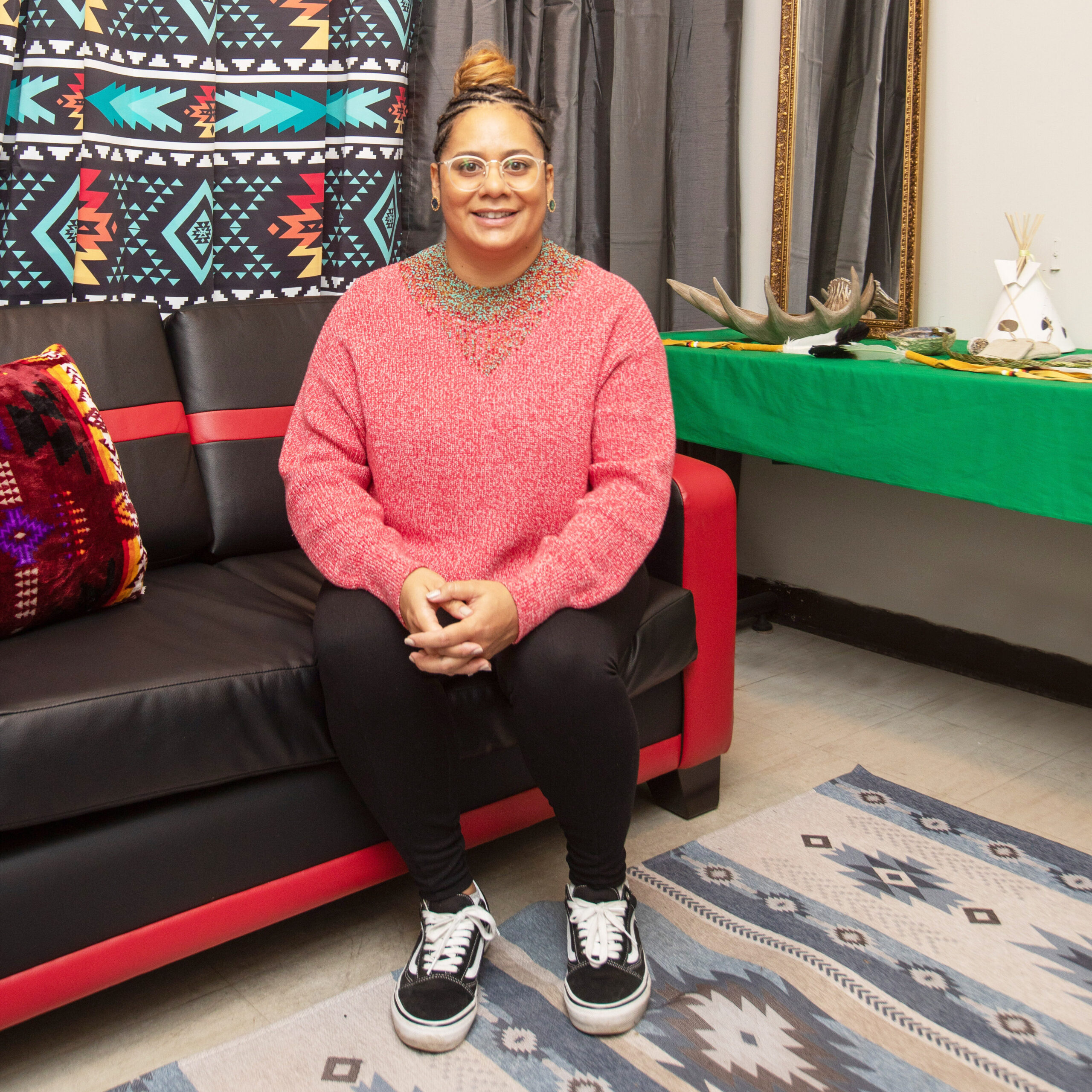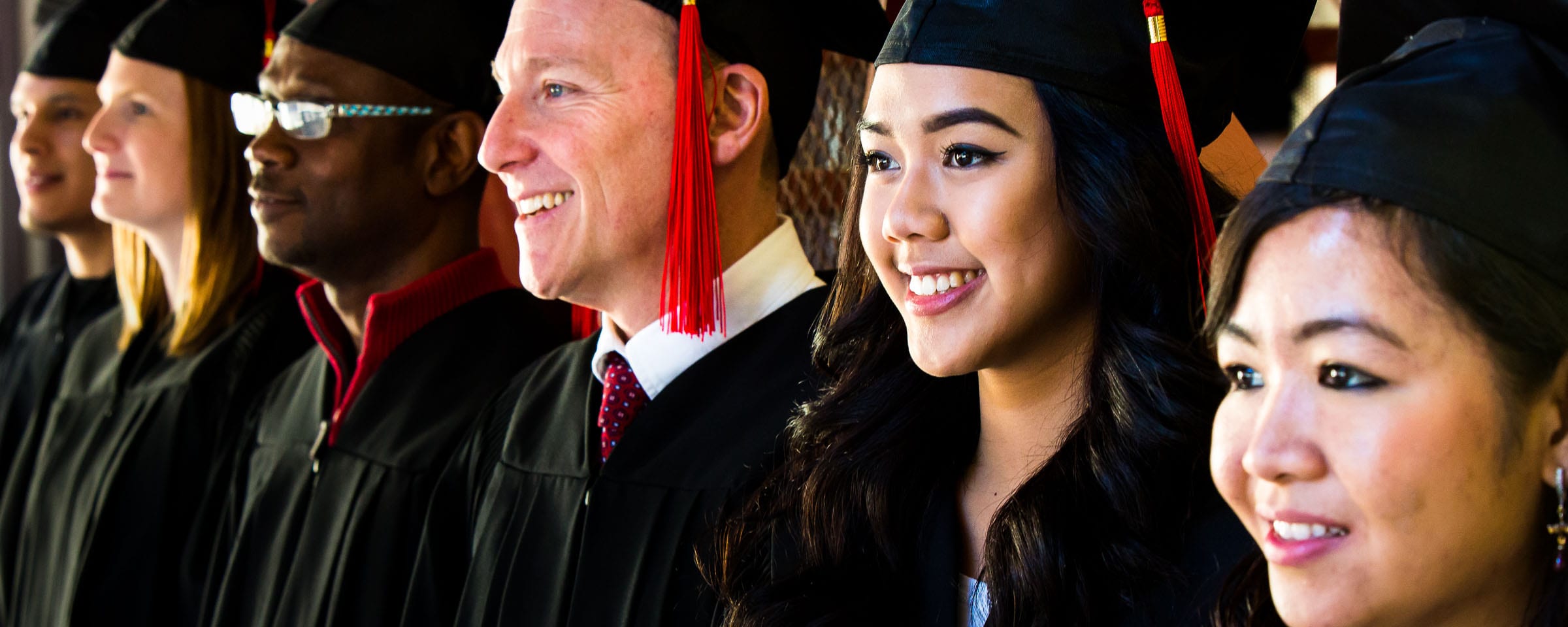Crossing Bridges: RRC Polytech grad finds career path while on journey of self discovery
Angelina Pelletier, a 2018 Community Development graduate, credits Red River College Polytechnic (RRC Polytech) with helping her find her way in work and in life.
“What stood out at the school was the sense of community,” said Pelletier “The educators, the staff – they won me over with a nurturing environment.”
Pelletier was born and raised in Swan Lake, a small community in southwestern Manitoba. Her mother, from Fiji, felt isolated in the rural town of 350 people. While her Métis father (“an army brat”) did not grow up exposed to his culture and experienced shame about his mixed ancestry, Angelina was experiencing Indigenous culture and ceremonies like the Annual Pow Wow at neighbouring Swan Lake First Nation.
She began to understand her heritage in a particular way.
“Being of mixed race, I didn’t fit in a box. I’d get the question – ‘What are you? Middle Eastern? Egyptian?’ I was ‘Othered.’”
“But my mom is classified as an Indigenous Fijian person. And there are parallels in the Aboriginal beliefs in Fiji and in Canada. I think of myself as Indigenous.”
The family moved to Winnipeg in 1997, settling in St. Boniface in time for Pelletier to begin sixth grade – and for her to affirm her French roots.
“I went to French schools in St. Boniface, including the school my grandfather once attended, back when it was an all-boys school. Across the street was the all-girls school where my grandmother went. St. Boniface is still where I live, and I remain fluent in French.”
Winnipeg exposed Pelletier to the cultures of newcomers from many parts of the world. But, it wasn’t until she was in the Community Development program at RRC Polytech, that Pelletier had the opportunity to complete a practicum in the North End, a vast urban section of the city with its own rich history of multiculturalism yet pervasive issues around poverty and racism.
“Dad had a pharmacy on Balmoral Avenue, but I hadn’t really crossed the bridge to know the community. The North End is so much more resilient and the people more willing to help one another out than many realize.”
After graduating from Windsor Park Collegiate in 2004, Pelletier went on to study at The University of Winnipeg, with an interest in becoming a lawyer. Plans changed after she became pregnant during her first year, giving birth to a son, Tayshaun, in 2006.
“I needed practical skills. I went to Herzing College and became a Legal Administrative Assistant. Then I went back to university and earned a Bachelor of Human Rights and Global Studies over a period of six years as I was raising my son. I couldn’t find employment – there wasn’t a big demand for human rights practitioners at the time.”
Pelletier took on roles in finance and call centre work, none fulfilling her ambitions or interest.
A new direction
Then, in 2014, after a long battle with cancer, Pelletier’s mother passed away. Looking through things her mother had given her, Pelletier opened a dictionary-thesaurus – a gift upon graduating from Herzing. Inside was an encouraging note. Pelletier continued flipping through the book, looking for inspiration. She landed on a sample cover letter for a community development job.
“I didn’t really know what community development meant. But I was looking to my mom, who wasn’t here anymore, for guidance.”
Pelletier found another thing while rummaging through her mother’s items: transcripts from Red River College from the late 90s. Like mother, like daughter? It was one more sign.
After looking into RRC Polytech’s program offerings, Pelletier took a third plunge into post-secondary education. In contrast to her university experience, she embraced all that RRC Polytech had to offer.

“It was time to ‘go for the gold’. This was so much more about my own life and my connections. I felt like more than a student number. All along, I was trying to connect.”
“I turned 30 the year I started the program,” she said. “And I was in a discovery stage.”
She recalls an impactful course, Working Across Differences, taught by Marianne Cerilli, a former member of the Manitoba Legislature (1990 to 2003.)
“We were unpacking all the assumptions we learn over our lives. It was about trying to understand other cultures, oppression, and colonization. It pushed me toward a genealogy search.”
“The program was the best experience of all my schooling. There was historical context, plus applied skills. It brought all my skills together in a tangible way that could be applied in the community.”
Prior to attending RRC Polytech, Pelletier volunteered with Newcomers Employment and Education Development Services (N.E.E.D.S.), and after graduating from Community Development, she volunteered at Main Street Project on the Board of Directors and on several committees. She then spent three years in different positions at Ndinawe, a non-profit organization dedicated to helping at-risk youth.
Earlier this year, Pelletier left Ndinawe to become a Team Lead at Ma Mawi Wi Chi Itata Centre’s Selkirk Avenue site in the North End, managing a housing program known as Wi Che Win.
Wi Che Win exists to help people find and keep a home. Pelletier supports a team of 15 staff who, in a typical day, might help a program participant complete paperwork or pick up food and bus tickets, support a program participant through a mental health crisis, or co-ordinate resources for the unsheltered.
An Indigenous worldview, including the support of Elders and the teachings of the Medicine Wheel, informs all services provided at Wi Che Win.
“I think I’m here with a good understanding of inner-city Winnipeg and the North End. I credit RRC Polytech with rounding out my cultural understanding of Indigenous practices – things like land acknowledgements and smudging, for example.”
“This is heart work,” Pelletier said. “Wi Che Win means “walk with me”—it’s not a piggyback ride. Part of my job is making sure staff have the resources and supports they need to heal from day-to-day interactions with our community members. But, if you can be in relationship with someone, chances are their life is going to be positively impacted that day.”
When asked if she is optimistic about community development in Winnipeg, Pelletier chooses another word.
“I’m hopeful about changes that will be coming in terms of adequate resources. We celebrate the small wins. If someone is on the streets for a year and then they have an apartment, and a bed, and groceries in the fridge, we recognize that win.”
“If we’re housing one person, that’s one more person in a less-precarious position.”
Pelletier’s own home includes reasons to be hopeful: her children, Aminata, two, and Tayshaun, 15, inspire her. Tayshaun is already following Pelletier’s example, volunteering with a community-based non-profit organization.
“He thinks I’m a superhero for the kind of work I do,” Pelletier said, smiling. “He’s serving soup on Sundays with a project called CommUNITY 204.”
“I might have given him a model, but he’ll make his own way.”
Profile by Randy Matthes (Creative Communications, 1993)

